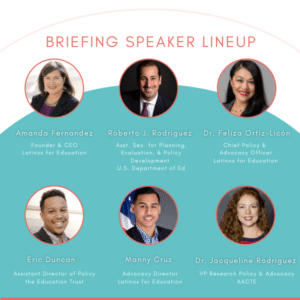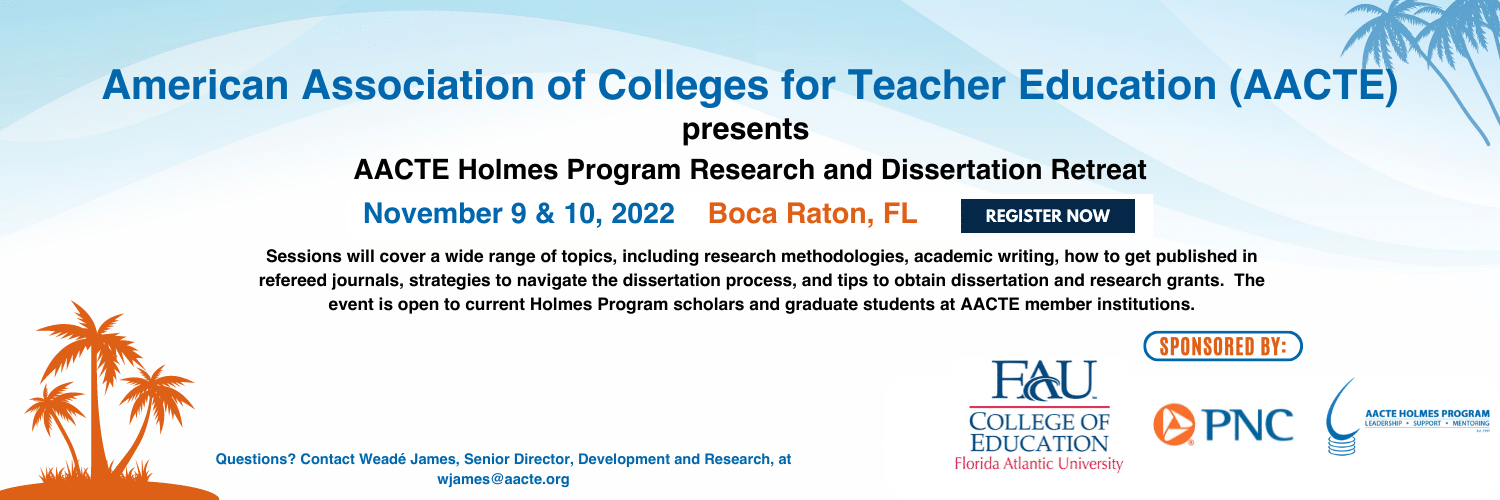20 Sep2022
Submit Your Proposal by October 1
By AACTE

As AACTE celebrates 75 years during its Annual Meeting, February 24 – 26 in Indianapolis, this year’s conference promises to be even more engaging under its theme “Innovation through Inspiration: Remembering the Past to Revolutionize the Future.”
Do you want to feature your work during AACTE’s 2023 Annual Meeting? This year’s conference is an opportunity to reflect upon our journey as we innovate for the future: What could, and should, authentic educator preparation, and education overall, look like? How do you we the discoveries of recent research and the successes of programs for the betterment of the profession? How do we continue to address inequities to shape a more equitable and just educational system?
20 Sep2022
By Kaitlyn Brennan

This weekly Washington Update is intended to keep members informed on Capitol Hill activities impacting the educator preparation community. The views expressed in this post do not necessarily reflect the views of AACTE.
This week, Secretary of Education Miguel Cardona and First Lady Dr. Jill Biden launched their “Road to Success Back to School Bus Tour.” The tour kicked off in Tennessee with a visit highlighting ways states and districts are recruiting and preparing qualified, profession-ready educators into the classroom. Later in the week, Second Gentleman Doug Emhoff joined the Secretary in Pennsylvania with visits highlighting how community schools are helping students recover academically and get the mental health supports they need, celebrate Hispanic Heritage Month, and raise awareness about the Administration’s actions to provide debt relief to millions, including teachers and administrators through Public Service Loan Forgiveness.
15 Sep2022
Registration Now Open
By Latinos for Education
AACTE’s Jacqueline Rodriguez, vice president, research, policy and advocacy, is a featured speaker at this briefing.
Registration is now open for the congressional briefing on educator diversity: Rise As A Collective! Join Latinos for Education on Wednesday, October 12, 3:00 – 4:30 p.m. EST in Washington, D.C., to address the critical need to increase and diversify the educator workforce.
for the congressional briefing on educator diversity: Rise As A Collective! Join Latinos for Education on Wednesday, October 12, 3:00 – 4:30 p.m. EST in Washington, D.C., to address the critical need to increase and diversify the educator workforce.
In attendance will be members of Congress, congressional staff, administration officials, and nonprofit leaders in a robust, action-driven discussion to address this pressing issue.
15 Sep2022
By Weade James

AACTE is excited to announce that registration is now open for the 2022 Holmes Research and Dissertation Retreat! The event will take place November 9 -10, 8:30 a.m. – 4:30 p.m. on both days at the campus of Florida Atlantic University in Boca Raton, FL.
15 Sep2022
By Karen B. Cotton
This article was originally published by Prairie View A&M University.
The teacher population in Texas does not reflect its student population. Beverly Sande, Ph.D., plans to change that statistic with $300,000 in funding from Texas Tech University–Texas Education Agency in collaboration with the University-School Partnerships for the Renewal of Educator Preparation (US PREP) National Center. The award will position Prairie View A&M University (PVAMU) to lead innovative efforts to increase diversity among the number of teachers.
15 Sep2022
By Kaitlyn Brennan
The new “In the States” feature by Kaitlyn Brennan is a weekly update to keep members informed on state-level activities impacting the education and educator preparation community.
Washington
Students attending the Seattle Public Schools system were slated to begin school last week, but on Tuesday, members of the Seattle Education Association voted to authorize a strike. Over 75% of union members participated in the vote with 95% of those who voted, voting in favor of a strike. Schools remained closed throughout the week as negotiations continue the school district. The Seattle Public School System serves more the 50,000 students with the union representing over 6,000 certified teachers, substitutes, paraprofessionals, and office professionals. One of the major striking points for union members are the need for more special education teachers and greater mental health and behavioral resources for students. As of Friday morning, the district and union had not come to an agreement.
15 Sep2022
By Shea Kerkhoff

The AACTE Committee on Global Diversity is hosting Internationalizing Education in Teacher Preparation, an October 6 webinar featuring the University of Missouri, St Louis College of Education faculty and staff, including Shea Kerkhoff. Below Kerkhoff outlines four initiatives they implemented to integrate a global perspective into its educator preparations programs.
Classrooms in St. Louis, like most of the country, are globally diverse and connected. Realizing the importance of including global perspectives and fostering international connections, the College of Education at the University of Missouri – St. Louis launched a year-long effort to enhance the internationalizing of our teacher preparation programs. The main objectives were to initiate a professional learning community centered on globally competent teaching, integrate global perspectives in our teacher education programs, create and share globally infused curricula, and strengthen international partnerships. The project was a comprehensive approach targeting faculty, staff, and students. Here we will share four of the initiatives from our year.
15 Sep2022
In 74 Interview, author Leslie T. Fenwick said the effects were so damaging that ‘the nation’s public schools still have not recovered’
By Greg Toppo
This story was produced by The 74, a non-profit, independent news organization focused on education in America.
 American students have attended school for nearly 70 years under the U.S. Supreme Court’s historic 1954 Brown v. Board of Education decision, which outlawed racial segregation in public schools. But a new book uncovers a little-known by-product of the case: Educators and policymakers in at least 17 states that operated separate “dual systems” of schools defied the spirit of Brown by closing schools that served Black students and demoting or firing an estimated 100,000 highly credentialed Black principals and teachers.
American students have attended school for nearly 70 years under the U.S. Supreme Court’s historic 1954 Brown v. Board of Education decision, which outlawed racial segregation in public schools. But a new book uncovers a little-known by-product of the case: Educators and policymakers in at least 17 states that operated separate “dual systems” of schools defied the spirit of Brown by closing schools that served Black students and demoting or firing an estimated 100,000 highly credentialed Black principals and teachers.
In Jim Crow’s Pink Slip, scholar Leslie T. Fenwick, tapping seldom-seen transcripts from a series of 1971 U.S. Senate hearings on the topic, writes that the loss of Black educators post-Brown was “the most significant brain drain from the U.S. public education system that the nation has ever seen. It was so pervasive and destabilizing that, even more than half-century later, the nation’s public schools still have not recovered.”
15 Sep2022
By Rachel Walker Bowman

In celebration of Hispanic Heritage Month, AACTE is re-posting an Ed Prep Matters article by student member Rachel Bowman that spotlights Mildred Boveda and David Fuentes, who discuss their heritage and what it means in the world of teacher education.
When Mildred Boveda, associate professor of special education at Penn State University, was filling out some basic forms required for an academic appointment, she came to a question that made her pause:
Which of these best describes your race/ethnicity?
- White/ Non-Hispanic
- Black/ Non-Hispanic
- Hispanic
The list went on.
Boveda, an Afro-Latina woman of Dominican descent and complex intersecting identities, had always felt more at home in the Black community. But the erasure of her Latina roots, even just through a checkmark, was not something she could reconcile with.
She checked Hispanic.
13 Sep2022
Apply by Oct. 31
By Michael Rose
One of the barriers to a diverse and well-prepared educator workforce is the high cost of college and student loan debt. Research has found that higher debt burdens are associated with students avoiding public service jobs, particularly in the education field.
To encourage highly qualified individuals to become teachers or serve in other public sector jobs, the federal government created the Public Service Loan Forgiveness program in 2007, which eliminates any remaining federal student loan debt for those individuals that make 120 qualified payments while working for a qualified non-profit employer.
13 Sep2022
By Beth Kubitskey
For 30 years, I have been involved in teaching and teacher education as a graduate student, lecturer, professional development facilitator, teacher, professor, and administrator. Most of that time I was part of the university system. I worked for years at one of the oldest teacher preparation programs in the country (Eastern Michigan University) and now at an institution that offers a non-profit higher education alternative route certification (University of Michigan – Flint, although it is a 30+ credit master’s program). I wondered if my experience prejudiced my view on for-profit alternative route programs (alt. routes). Was my negative visceral reaction to “why can’t getting your teaching certificate be like getting a real estate license?” justified? With enrollment in traditional higher education teacher preparations falling 47% from 2010-2020 and enrollment in for-profit alternative routes up 140%, am I just reacting to the threat?
The webinar presented by AACTE: “The Growth and Impact of Alternative Certification: Findings from Two Studies” confirmed my concerns. Texas, the first state to approve non-higher education alt-routes, prepares more teachers than any other state in the country, and as of 2018-19, had 41 for-profit alt route programs that accounted for 68% of all enrollments in teacher education programs in the state. As such, Texas was used as the site of a two-components study on for-profit alternative route certification programs.
12 Sep2022
By Rachel Besharat Mann

Rachel Besharat Mann will share her experience in translating learning sciences into practice using the Digital Promise Learner Variability Navigator tool during the webinar co-hosted by AACTE, “Learning Sciences Research for the Classroom” on September 26, 2:00 – 3:00 p.m. Below, Mann offers a preview about her experience using the web app for whole child learning.
You can read all of the teaching books and take all of the courses but being in the classroom is a completely different experience. You are working with individual people with varied backgrounds and needs and their behaviors; strengths, and needs can change based on a variety of factors outside of a teacher’s control. There is no roadmap to tell you how students learn differently or even if they are learning at all. This is a lesson I’ve learned the hard way over the years and have vowed to help my higher education students avoid the same pitfalls in K-12 classrooms that I did.
12 Sep2022
By Kaitlyn Brennan
This weekly Washington Update is intended to keep members informed on Capitol Hill activities impacting the educator preparation community. The views expressed in this post do not necessarily reflect the views of AACTE.
Congress may have been on recess for the month of August, but it certainly did not feel like a break. Behind the scenes staffers maintained diligent in their work as Members spent time both in Washington, D.C. and their home states and districts for the opportunity to hear directly from constituents. In mid-August, President Biden signed into law the Inflation Reduction Act. The Inflation Reduction Act is the legislation we have formerly referred to as the “reconciliation bill” or “Build Back Better.” That said, the Inflation Reduction Act is much different than any of the previously proposed “reconciliation bills” — including no investments in the educator workforce. Read more about what is included in the Inflation Reduction Act.
12 Sep2022
By Learning First Alliance
On September 1st, 2022, the Commissioner of the National Center for Education Statistics released the mathematics and reading results of 9-year-olds from the 2022 NAEP long-term trend assessment. The following summary is from NAEP’s Highlights report:
In 2022, the National Center for Education Statistics (NCES) conducted a special administration of the NAEP long-term trend (LTT) reading and mathematics assessments for age 9 students to examine student achievement during the COVID-19 pandemic. Average scores for age 9 students in 2022 declined 5 points in reading and 7 points in mathematics compared to 2020. This is the largest average score decline in reading since 1990, and the first ever score decline in mathematics.
09 Sep2022
By Leslie Ekpe

Congratulations to Daniqua Williams, named Holmes Scholar of the month to kick off the 2022-2023 academic year! In June of 2022, Williams successfully defended her dissertation study titled “Assessing Multicultural Counseling Competency Training with College Counselors who Serve International Students.”










